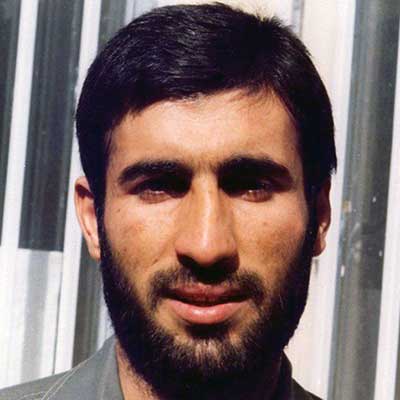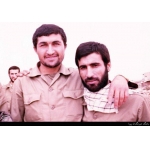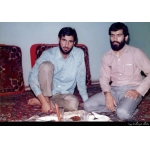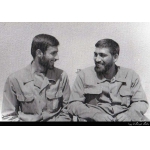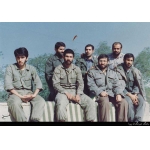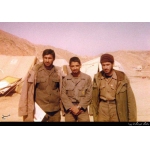Ehsan-Nia, Mahdi
Masoumeh Abedini
326 بازدید
Mahdi Ehsan-Nia (1957-1986) served as the deputy of planning and operations at the Karbala Headquarters during the Iran-Iraq War.
Born on June 17, 1957, in Shush-Danyal, Ehsan-Nia completed his primary in Shush before moving with his family to Ahvaz. He pursued his secondary education in natural sciences in Ahvaz and gained admission to the Medical University of Shiraz in 1979. During this time, as the popular struggle against the Pahlavi regime intensified, he made several trips to Tehran to collect messages and tapes of Imam Khomeini's speeches which he then distributed in Khuzestan. After the victory of the Islamic Revolution, he joined the Islamic Revolutionary Guard Corps (IRGC) of Khuzestan (Ahvaz).
In the wake of the Iran-Iraq War, when Susangerd was besieged by Iraqi forces, Ehsan-Nia along with other Iranian forces destroyed Iraqi tanks on the battlefield. Later, given the need for organizing the volunteer forces, he was transferred to the South Operations Headquarters’ dispatch department where he played a significant role in training and developing the capabilities of the forces. Afterwards, he joined the 19th Fajr Division (Fars Province), taking charge of the personnel unit of the Qods Division (Gilan Province).
After the restructuring of the IRGC in 1983, Ehsan-Nia assumed the role of personnel officer of the 8th Operational Region and returned to Ahvaz. Later, he transitioned to become the personnel officer of the 3rd Operational Region. Despite his responsibilities, he actively participated in every operation conducted in the southern part of the country.
In 1985, Ehsan-Nia joined the planning and operations unit of the Karbala Headquarters and was subsequently promoted to deputy director. After years of dedicated service across various administrative and military sectors, Ehsan-Nia was martyred on April 20, 1986, in the operational area of Valfajr 8 (Faw). After his funeral procession, his body was laid to rest in the Ahvaz Martyrs' Cemetery. His mother was also martyred by Saudi agents during the Hajj pilgrimage in 1987.
In one of his handwritten notes, we read: "Spiritual accounting and constant self-assessment of one’s thoughts and deeds prevent him from the deviation of the divine path. O God, I want to remain true to my pledge until my last breath; help me make fewer mistakes and serve more. O God, support us so that we can stand firm against all adversities. Be with us, for with You, we have everything, and without You, we are lost and nothing. O Merciful and Compassionate One, if death is to embrace me, I implore You to grant me martyrdom in Your path. O God, You are aware that I do not fear death; I fear the world, my deeds, and the carnal desires that might have distanced us. My fear is not of dying but of how I die, lest my final moments be tainted with sin".[1]
[1] A summary of an article published in the Sacred Defense Encyclopedia, Vol. 1, Tehran, The Center of Encyclopedia of the Sacred Defense Research Institute, 2011, Pp. 354-358.


